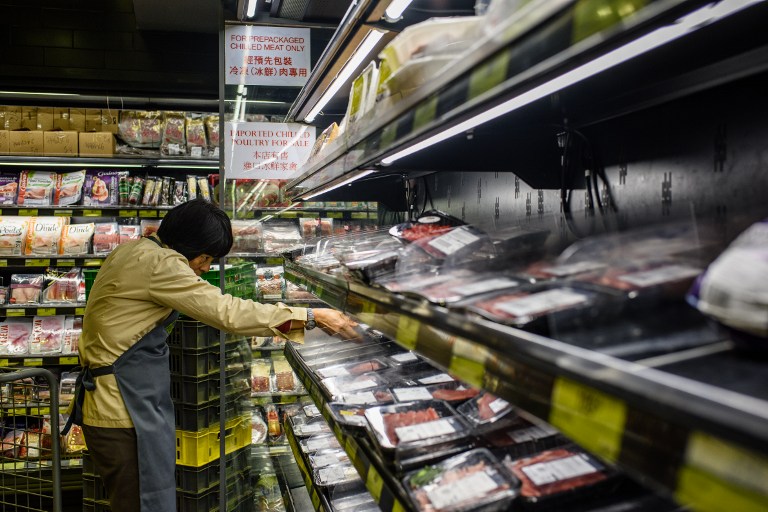Hong Kong bans Brazil meat amid rotten meat scam

A store clerk takes packs of meat imported from Brazil off the shelves of a supermarket in Hong Kong on March 21, 2017, after Hong Kong’s Center for Food Safety said it had temporarily suspended the import of frozen and chilled meat and poultry from Brazil. Hong Kong became the latest government to suspend imports from Brazil on March 21 in the wake of a rotten meat scandal. AFP
BRASÍLIA, Brazil — Brazil’s giant meat industry suffered a heavy blow Tuesday, when Hong Kong became the latest to ban imports in response to allegations of rotten meat being sold with falsified certificates.
Hong Kong is the biggest market for Brazilian beef, importing $718 million worth in 2016, according to Brazilian government figures.
Hong Kong’s Centre for Food Safety said it had temporarily suspended the import of frozen and chilled meat and poultry “in view of the fact that the quality of the meat from Brazil is in question.”
This followed a similar ban by China, which is Brazil’s biggest market for beef and poultry overall.
READ: China, EU ban Brazil meat after rotten scandal
Article continues after this advertisementSouth Korea, for its part, lifted a temporary suspension on the distribution of chicken already imported from Brazil, after authorities there performed quality inspections and confirmed that no tainted poultry had entered the country.
Article continues after this advertisementIt has no plans to close its market to Brazilian meat, the South Korean embassy in Brasilia said.
But the European Union earlier demanded a stop to exports by four companies implicated in the scandal, while Chile suspended all meat imports, prompting Brazil to threaten retaliatory measures against its Latin American trade partner.
Mexico issued its own ban on poultry imports late Tuesday, saying it wanted Brazil “to show scientific proof and guarantees of the sanitary level, quality and safety” of the produce.
Brazil’s neighbor Argentina announced it was ready for “an even greater increase in the usual (quality) controls.”
Japan, which is Brazil’s third biggest market for chicken, with $720 million in sales, said it would not allow imports of products from the 21 businesses under investigation in Brazil.
And Russia, which has heavily relied on Brazilian imports since banning US and European Union food imports, said it wanted clarifications from Brazil.
“We expect more than 30 countries to question Brazil about this issue,” Brazilian Agriculture Minister Blairo Maggi said Monday.
National ’embarrassment’
Officials have been scrambling to contain the damage since Brazilian police announced the results of a two-year investigation on Friday.
According to police, health inspectors were bribed to certify meat no longer fit for consumption, while additives were used to mask problems in the produce.
Exports have been stopped from all 21 meat processors under investigation, and at least 30 people have been arrested.
A poultry-processing plant run by the multinational BRF group and two meat-processing plants operated by the local Peccin company were shut down.
Brazil exports meat to more than 150 countries, with 2016 sales of beef and poultry reaching more than $10 billion.
Total meat exports amount to about seven percent of exports and 0.7 percent of gross domestic product, according to Capital Economics.
The Folha newspaper reported that 21 meat processing companies forced to halt exports while they undergo investigation represent less than one percent of total Brazilian meat exports.
However, the damage to the industry’s reputation could be far reaching, hitting Brazil just as the country struggles to exit its worst recession in history.
President Michel Temer called the quantities involved in the scandal “insignificant” on Tuesday, but he admitted there had been “an embarrassment.”
The scandal also broke right ahead of negotiations to seek a free-trade accord between the European Union and several South American countries including Brazil.
France and other European countries are wary about opening up the EU meat market to countries in the South American Mercosur bloc, which includes major exporters Brazil and Argentina. Paraguay and Uruguay are the other members. CBB